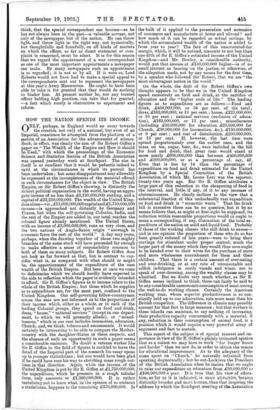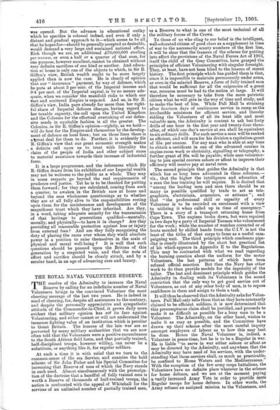HOW THE NATION SPENDS ITS INCOME.
ONLY, perhaps, in England would an essay towards the creation not only of a national, but even of an Imperial, conscience be attempted from the platform of a section of an Association for the advancement of science. Such, in effect, was clearly the aim of Sir Robert Giffen's paper on " The Wealth of the Empire and How it should be Used," with which the proceedings of the Economic Science and Statistics Section of the British Association was opened yesterday week at Southport. The aim in itself is so excellent that it would be pedantic indeed to cavil at the. circumstances in which its pursuit has been undertaken ; but some disappointment may allowably be expressed at the incompleteness of the material offered in such circumstances for the object in view. The British Empire, on Sir Robert Giffen's showing, is distinctly the richest political organisation in the world, having an aggre- gate income of no less than £3,130,000,000 sterling, and a capital of £22,250,000,000. The wealth of the United King- dom alone—viz., X15,000,000,000 c,apital and X1,750,000,000 income—is approached not distantly by Germany and France, but when the self-governing Colonies, India, and the rest of the Empire are added in, our total reaches the colossal figure already mentioned. The United States, with an income of £3,000,000,000, runs us very close, and the two nations of Anglo-Saxon origin " outweigh in economic force the rest of the world." A day may come, perhaps, when the drawing together of those two mighty branches of the same stock will have proceeded far enough to make effective a sense of responsibility common to both of them on many subjects. Sir Robert Giffen does not look as far forward as that, but is content to con- sider what is, as compared with what should or might be, the apportionment of the expenditure of the vast wealth of the British Empire. But here at once we come to deficiencies which we should hardly have expected in the aids to reflection which the paper is evidently intended to afford. Sir R. Giffen's figures as to income relate to the whole of the British Empire; but those which be supplies as to expenditure are, for the most part, confined to the United Kingdom. Our self-governing fellow-countrymen across the seas are not informed as to the proportions of their income which, either as a whole, or in each of the leading Colonial groups, they spend on food and drink, dress, " house," " national services " (except in one depart- ment, to which we will presently allude), or " miscel- laneous," which in our case includes locomotion, education, Church, and, we think, tobacco and amusements. It would certainly be interesting to be able to compare the Mother- country with the daughter-States in these respects, and the absence of such an opportunity in such a paper seems a considerable omission. -No doubt a veteran worker like Sir R. Giffan in the field of figures is entitled to leave the detail of the Imperial part of the research his essay opens up to younger statisticians ; but one would have been glad if he could have seen his way to sketching some rough out- lines in that direction. Again, while the income of the United Kingdom is put by Sir R. Giffen at £1,750,000,000, the expenditure, which, he presents in a rough tabular form, only amounts to £1,380,000,000. It is rather tantalising not to learn what, in the opinion of so eminent statisticidn, happens to the remaining X370,000,000. Is the bulk of it applied to the prosecution and extension of commerce and manufacture at home and abroad ? and how much of it can be regarded as actual savings, by which the accumulated wealth of the nation is added to from year to year? The fate of this unaccounted-for margin, which, it will be noticed, amounts to not less than one-fifth of Sir R. Giffen's estimated income of the United Kingdom—and Mr. Bowley, a considerable authority, would put that income at £150,000,000 higher—is of no small interest as bearing on the justice, or otherwise, of the allegation made, not by any means for the first time, by a speaker who followed Sir Robert, that we are "the most extravagant nation in the world."
On the whole, the drift of Sir Robert Giffen's own thought appears to be that we in the United Kingdom spend excessively on food. and drink, at the sacrifice of education and the "higher ends of life." The leading figures as to expenditure are as follows :—Food and drink, £468,000,000, or 34 per cent. of the total ; dress, £182,000,000, or 13 per cent. ; house, £223,000,000, or 16 per cent. ; national services (exclusive of educa- tion), £183,000,000, or 13 per cent. ; miscellaneous (including £30,000,000 for education, £25,000,000. for Church, £30,000,000 for locomotion, &c.), £130,000,000, or 9 per cent. ; and cost of distribution, £200,000,000, or 15 per cent. If, however, the last item were spread proportionately over the earlier ones, and the taxes on tea, sugar, beer, &c., were included in the bill for food and drink, that great item would stand at more nearly £600,000,000 than between £400,000,000. and. £500,000,000, or at a percentage of, say, 42.. Even that is less by 14 than the percentage of expenditure on food. and drink estimated for the United Kingdom by a Special Committee of the British. Association, of which Mr. Leone Levi was the reporter, twenty-two years ago. But Sir R. Giffen attributes a large part of this reduction to the cheapening of food in. the interval, and little, if any,, of it to any increase of abstemiousness. He clearly inclines to the view that a, substantial fraction of this undoubtedly vast expenditure, on food and drink is " economic waste." That the drink bill is excessive there can be no question, but it by no, means follows that, as might at first sight be supposed, its reduction within reasonable proportions would or ought to, mean a corresponding, if any, diminution of the total ex-. penditure of the nation on solid and.liquid food. Probably if those of the working classes who still drink to excess— and in our opinion the proportion of them who do so has been greatly reduced of late years—were to bring their cravings for stimulant under proper control, much the larger part of the money which they would. thus save ought to be handed over to their wives for the purchase of more and more wholesome nourishment for them and their children. That there is a certain amount of over-eating. and over-drinking, or at any rate of unreasonable and selfish indulgence in costly viands and wines, not to speak of over-dressing, among the wealthy classes may be admitted. But we doubt very much whether, as. Sir Giffen seems inclined to think, there can fairly be said to be any considerable uneconomic consumption of meat among the well-to-do working classes. Certainly the American working man, whose superior productiveness is so con- stantlyQheld. up to our admiration, eats more meat than his British competitor. The difference in climate may possibly account for that fact in large measure ; but that workers in these islands can maintain, to say nothing of increasing. their productive capacity concurrently with a material, if any, reduction in their consumption of animal food, is a position which it would require a. very powerful array of argument and fact to sustain.
This aspect of the subject is of special interest and im- portance in view of Sir R. Giffen's plainly intimated opinion that as a nation we may have to work " for longer hours and harder " than we now do, in order to obtain the means for educational improvement. As to the adequacy of the sums spent on " Church," he naturally refrained from speaking dogmatically ; but he out-Locky, era the President of the British Association when he insists that we ought to raise our expenditure on education from £30,000,000 to £100,000,000 a year. 'It is true that his view of educa- tion, so far as it is indicated, is more attractive, because distinctly broader and more human, than that inspiring the address by which the Southport meeting of the Association was opened. But the advance in educational outlay which he specifies is colossal indeed, and even if only a distant and gradual approach to it—which seems to be all that he hopes for—should be generally accepted as desirable, would demand a very large and sustained national effort. Rich though we are, an additional £70,000,000 sterling per annum, or even a half or a quarter of that sum, for one purpose, however excellent, cannot be obtained without very definite sacrifices of one kind or another. And educa- tion at home is only one of the objects to which, in Sir R. Giffen's view, British wealth ought to be more largely applied than is now the case. He is clearly of opinion that our " insurance " payment, by way of defence, which he puts at about 3 per cent. of the Imperial income and 04 per cent. of the Imperial capital, is by no means ade- quate, when we consider the manifold risks to which our vast and scattered Empire is expcsed. And as, in Sir R. Giffen's view, India pays already far more than her right- ful share of Imperial defence charges, having regard to her taxable capacity, the call upon the United Kingdom and the Colonies for the effectual overtaking of our defen- sive needs in equitable fashion is all the greater. The Colonies, in Sir R. Giffen's opinion—rightly, as we hold— will do best for the Empire and themselves by the develop- ment of defence on local lines ; but on those lines there is a treat deal for them to do. Further, it is evidently Sir R. Giffen's view that our great economic strength makes a definite call upon us to treat with liberality the claim of the people of India and other subject races to material assistance towards their increase of industrial force. • It is a large programme, and the inferences which Sir R. Giffen draws from his exhibition of our Imperial wealth may not be welcome to the public as a whole. They may in some respects go beyond the real requirements of prudence and justice. Yet he is to be thanked for putting them forward ; for they are calculated, coming from such a quarter, to awaken in the British race at home and beyond the seas wholesome questionings as to whether they are at all fully alive to the responsibilities resting upon them for the maintenance and development of the magnificent trust which they have inherited. Are they, in a word, taking adequate security for the transmission of that heritage to generations qualified—mentally, morally, and physically—to have it in charge ? Are they providing all reasonable protection against loss or injury from external foes ? And are they fully recognising the duty of placing the races over whom they wield absolute power in a position to raise themselves in the scale of physical and moral well-being ? It is well that such questions should be pressed upon the Britons of this generation by a respected voice, and that the note of effort and sacrifice should be clearly struck, and by a secular hand, in an age of advancing ease and luxury.







































 Previous page
Previous page